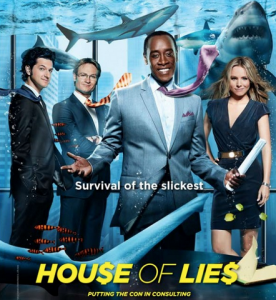House of Lies, a riveting award-winning TV series, is a scathing indictment of the world of management consulting. When you strip away the hyper-real excess of lust, luxury, greed and vengeance, what truth, if any, can we find?
Beyond the entertainment value, there seems little that is real in the world of management consultant star Marty Kaan (played by the excellent Don Cheadle) and his super ambitious colleagues. Everything is excessive, from the crude language to the elaborate acts of dog-eat-dog aggression. While there may be consulting firms out there that have inspired this TV drama, this is certainly not reality for most consultants making an honest living through earnest efforts to improve the performance of their clients’ companies.
Beyond the outrageous and often Machiavellian behavior, what is it about Marty Kaan’s model that is so flawed?
Imposing the model
Marty’s approach is old school in that it imposes a model. Marty’s goal is to “open their wallets not their minds”. He has a recipe that has had success in the past in certain situations. He is able to persuade clients to spend a lot of money to buy into that success. He has an army of “hungry MBAs” crunching numbers. These numbers can indeed provide data that can be useful. However, this is far from being a full solution.
Harnessing the knowledge of the client
The truth is that in every organization there is already a wealth of knowledge. An organization does not need a consultant to bring in a solution. They need to be guided to create their own solution from what they already know. It is a fact that no system can change itself. Often the leaders of an organization get stuck because they are blinded by their own mental models, even their own success, and need outside help to see what exactly needs to be changed and how to methodically implement that change. A ready made model is not the answer. However, what can bring true value is to provide an organization with a framework for positive change. That framework should be based on profound knowledge of how organizations function at their deepest, systemic level, an understanding of variation and synchronization, with the purpose of guiding people to create new synaptic connections to generate new solutions from the knowledge they already have. This provides a whole new perspective; it opens minds and allows organizations to develop their own ability to generate solutions going forward.
Beyond the comfort zone
It can happen that when an organization moves forward on a path of positive change, the leaders of that organization move into a new zone that is unfamiliar and therefore beyond their comfort zone. This is where it is crucial to have a strong relationship of trust with the consultants who are enabling the change to happen. This trust can only exist when the consultants bring profound knowledge of their own subject matter.
Bringing true value
Marty Kaan and Associates reflect a mindset based on greed and ambition (both theirs and the client’s) where the consultants hunt their kill and where if somebody wins then somebody else always loses. We now live in a world where we need to develop systemic intelligence, not cunning, so we can navigate complexity, and this involves relationships built on collaboration, cooperation and trust. When consultants have that knowledge, then they can bring the true value of applying that knowledge together with their clients. There are no short cuts, no tips or tricks, no ready-made formats. There is only deep study, meticulous implementation and the satisfaction of a relationship where everybody can win. That’s probably not the subject-matter of prime time TV drama.
About the Author
Angela Montgomery Ph.D. is Partner and Co-founder of Intelligent Management, founded by Dr. Domenico Lepore. Dr. Montgomery’s new business novel+ website The Human Constraint looks at how Deming and the Theory of Constraints can create the organization of the future, based on collaboration, network and social innovation.






Nice